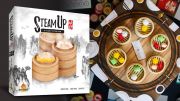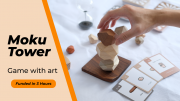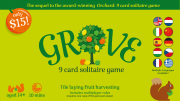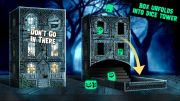Paint the Roses (North Star Games) – Decorate the garden in a way that pleases the queen in this cooperative deduction game. The queen will chase you around the score tracker, and if she ever catches up with you, the players lose the game. As the game progresses the queen also moves more quickly. In order to stay ahead of her, each turn players will be adding shrub tiles to the board and reveal new information about the queen's secret requirements for the garden, with each player holding one of the queen's whim cards. Once the tile is placed, each player checks their whim cards. If the newly placed tile and an adjacent tile match a player's whim card, he places one clue token for each adjacent tile that creates a match. Players must then try to guess what icons are on any one player's whim card. If they are correct, the player piece moves up the score tracker and the queen then moves up. If they are wrong, only the queen moves and she moves at double her normal speed. If a whim card has been guessed, it is discarded and the player who discarded it draws a new one. Players win if there are no more spaces in the garden to be filled.
Casual Games on Kickstarter: Paint Roses, Eat Dim Sum, and Deliver Pizza

This month on Kickstarter there’s cooperative deduction, two games that originated in Japan, a dexterity game, as well as a small-sized solo card game, a spooky game perfect for Halloween, and one that is sure to leave you hungry for some dim sum.
Steam Up: A Feast of Dim Sum (Hot Banana Games) – The game features a turntable wheel on which stacks of steamers are placed. Your goal is to eat the dim sum in those steamers, but you can only take a steamer if it is the top steamer on one of the two stacks directly in front of you. On your turn you must take two different actions. Actions include drawing a fortune card which can be played for special abilities, taking a food token, rotating the food table, and purchasing a steamer with food tokens. When you collect a steamer you place the dim sum tokens on empty spaces on your player board, earning points equal to the number show on those spaces.
Dandelions and Psychic Pizza Deliverers Go to the Ghost Town (BoardGameTables.com) – Two different games from Japan. In Dandelions, you roll all of your eleven dice at the start of the game and must then decide over the course of the game which order to use them in to move, in a clever twist on the roll-and-move genre. In Psychic Pizza Deliverers Go to the Ghost Town, one player is the ghost town mayor and the other two players are pizza deliverers. The deliverers must move their tokens blindly around town, unable to see the map, while between moves the mayor gives them information about the surroundings for use on their next move. The first player to find pizza and then deliver it to the correct house wins the game.
Moku Tower (Woodas) – On your turn you start the timer, and have until the timer ends to draw cards from the three decks in the game and build a tower with the game’s wooden game pieces. The card from the first deck tells you how to start your tower: which pieces to use and in what order. You then draw cards from the extra pieces deck, which will give you extra pieces to add to your tower. You can draw as many of these as you want, but once a card is drawn you must build with that card. Finally, you may draw up to one bonus card that gives you an extra challenge while you stack your tower. If you succeed, you get the points the cards are worth and your turn ends. If your tower falls over, your turn immediately ends. As soon as your turn ends, you flip over the timer, so that the sooner you finish your turn the less time the next player will have to complete their own tower.
Grove (Side Room Games) – In this small-sized solo game, you start by randomly selecting nine cards from the deck of eighteen (the rest are returned to the box) and shuffling them. The top card is then played face-up to form the start of your grove, and you draw two cards into your hand. Cards have six spaces, which can show empty glades or trees of different fruit types holding different numbers of fruit. Each turn, you play a card from your hand to your grove. You can rotate it and overlap one or more cards already in play. Any tree on the card can overlap a glade, while a glade can overlap a tree or another glade. For a tree to overlap another tree, they must both have the same type of fruit. Each time you match trees, you place a die on it, setting it to the number of total fruit depicted on the overlapping trees. The number can increase if you overlap even more cards. When you overlap a tree with a glade, you do not lose any fruit you accumulated on that tree. You then end your turn by drawing a card.
Don't Go In There (R2i Games) – You are playing as a group of kids trapped in a haunted house. Players take turns placing a meeple on one of the room cards, choosing how far into the room to go. After a third meeple has been placed in a room, that room is resolved. First, you roll for ghosts by dropping the five glow-in-the-dark ghost dice down the dice tower that is formed by the game box. Then, depending on how far they are into the room, every player with a meeple there must activate a certain number of die results. For each ghost you activate, you must take one ghost token. Next, players take turns claiming one curse card from that room, starting with the player furthest inside. The meeples are then removed from the room and returned to their respective players, and three new curse cards are added to it. Each curse card has a certain curse value. Once all the curse cards have been claimed, the game ends. At the end of the game, the player with the most ghosts earns one curse point for every two ghost tokens they have. The least cursed player wins.
Disclosure: unless otherwise noted, we have not seen or played any of the above games. Our assessment of each is based on the information given on the crowdfunding project page.










